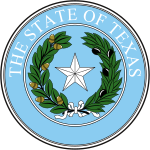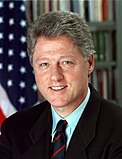| |||||||||||||||||||||||||||||||||
| Turnout | 53.24% (of registered voters) 40.97% (of voting age population)[1] | ||||||||||||||||||||||||||||||||
|---|---|---|---|---|---|---|---|---|---|---|---|---|---|---|---|---|---|---|---|---|---|---|---|---|---|---|---|---|---|---|---|---|---|
| |||||||||||||||||||||||||||||||||
| |||||||||||||||||||||||||||||||||
| |||||||||||||||||||||||||||||||||
| Elections in Texas |
|---|
 |
|
|
The 1996 United States presidential election in Texas took place on November 5, 1996. All fifty states, and the District of Columbia, took part in the 1996 United States presidential election. State voters chose 32 electors to the Electoral College, which selected the president and vice president.
Texas was won by Kansas Senator Bob Dole, who was running against incumbent President Bill Clinton of Arkansas. Clinton ran a second time with incumbent Vice President Al Gore as his running mate, and Dole ran with former New York Representative Jack Kemp. Texas provided both two of the nation's three most Republican counties – High Plains-based Ochiltree in its north and Glasscock in the central plains – and its most Democratic county in rock-ribbed Tejano Starr County at the opposite end of the state.[2]
Texas weighed in for this election 13% more Republican than the national average. With its 32 electoral votes, Texas was Dole's biggest electoral college prize. The presidential election of 1996 was a very multi-partisan election for Texas, with more than 7% of the electorate voting for third-party candidates. In his second bid for the presidency, Ross Perot led the newly reformed Reform Party to gain over 6% of the votes in his home state of Texas, and to pull in support nationally as the most popular third-party candidate to run for United States presidency in recent times. Loving County, Texas was one of two counties nationwide in which Ross Perot came in second place, ahead of one of the two major-party nominees, in 1996, the other being Arthur County, Nebraska.
The political realignment of the rural United States in the 21st century, aided by Texas Governor George W. Bush being the Republican nominee in the 2000 and 2004 presidential elections, resulted in the state's rural areas--including in traditional Democratic strongholds like East Texas--growing dramatically more Republican after this election. Primarily due to Clinton's rural appeal, this would be the last election in which rural Texas played a factor in the close margin, as almost all of these counties switched from Democratic to Republican beginning in 2000.
- ^ "Turnout and Voter Registration Figures (1970-current)".
- ^ "1996 Presidential General Election Results – Texas". Dave Leip's Atlas of U.S. Presidential Elections. Retrieved January 26, 2018.





